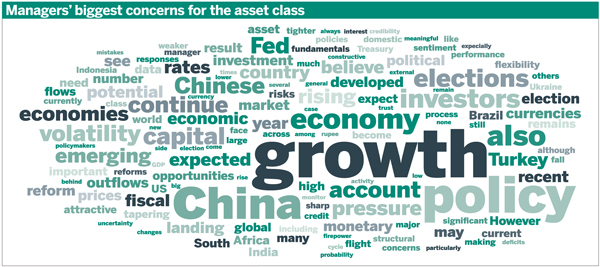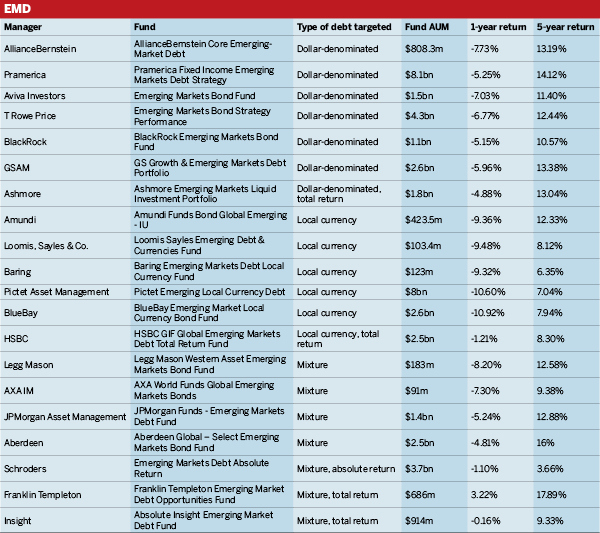The second part of this year's emerging market debt survey looks at the best performing funds over the medium term, and what risks managers see to pension fund portfolios.
In 2013, the manager funds surveyed by Pensions Expert had an average loss of 5.9 per cent net of fees (see table at bottom). The five-year, annualised average performance was an 11 per cent gain.
So no worries then? Inevitably the risk budget of the individual scheme holds the answer to that question. But it is clear the EMD argument has wobbled in recent months.
“[We are] a bit worried about the outlook of emerging markets in the shorter term… but just from a valuation perspective, emerging market debt is looking quite interesting,” says Michael Allen, chief investment officer at Momentum Global Investment Management.
The manager’s asset allocation strategy is looking to dollar-denominated EMD to make up some of the yield it cannot make in the developed world.

“Despite the pick-up in yield that we saw at the tail end of last year, we still expect on a medium-term basis to lose money in the treasury market, in the UK gilt market [and] in the linker market as well,” says Allen.
He adds: “Again [in EMD] on a five-year view you can probably do a bit better than loans – obviously it’s a somewhat more volatile asset class, but at least it doesn’t come with EM currency risk.”
EMD fund managers are seeing reasons to be cheerful. “We still believe the growth in developed markets will translate into export demand for emerging markets,” says Sergio Trigo Paz, head of EMD at BlackRock.
“That will be positive for credit spreads this year, which might offset the impact of a rise in yields following a moderate increase in US interest rates.”
Sell-offs have led to yield levels that have not been seen since 2010, says David Bessey, head of EMD at Pramerica Fixed Income.
“Despite the negative headlines surrounding the ‘fragile five’ countries, the economic outlook for many countries remains solid,” he adds.
“Emerging markets’ growth should pick up throughout 2014, driven in part by an accelerating expansion in the developed world, a weakening of currencies, and a continuation of easy fiscal and monetary policies in most countries with low inflation rates.
The stumbling blocks
The key concerns of the 20 asset managers we surveyed came back again and again with the same topics: Chinese growth and policy, developed-world monetary policy and elections.
We have taken all the commentary provided to us by these investors and constructed the above word cloud. The larger the word, the more commonly it was raised as a concern.
Front-and-centre was Beijing’s ability to reduce in a stable and organised manner its government financing, its leverage ratio.
“We maintain that this is essentially a fiscal issue that the Chinese government has ample flexibility to manage, and we like the way they have done it so far,” says Damien Buchet, head of emerging market fixed income at Axa Investment Managers.
“However, 2014 will be trickier as a number of trust loans mature and, although we trust that fiscal resources are plentiful to plug the gaps, we are always mindful of the broader market impact of any China-related headlines.”
The biggest unknowns in emerging markets are often unforeseen and unwanted policy shifts, often called simply country-specific risk.
“That is the risk that a government in one or more emerging market countries makes a particularly serious domestic policy mistake,” says Jan Dehn, head of research at manager Ashmore.
“The EM universe is now more than 60 countries, so investors can easily shield themselves against such risks by actively reducing exposure to these countries in a broad diversified portfolio of EM investments.”
Dehn adds the untested economic policies of developed nations trying to manage their debts is another risk in addition to the potential fallout from protectionism elsewhere.
“This would hurt emerging market and developed economies alike, though it would ultimately be more damaging for developed economies than for emerging markets on account of the weaker fundamentals of the former,” he says.
Another popular concern among managers was the prospect of EM elections destabilising the fragile five and delaying reforms.
Turkey heads to the polls for presidential elections in August, Brazil in October, while general elections are also due this year in South Africa and India, and Indonesia has both legislative and presidential elections.
“Given the heavy election cycle in 2014, many EMs will struggle to implement unpopular reforms ahead of the electoral process,” said Jeff Kalinowski, portfolio specialist at T Rowe Price.
“We expect that much reform activity will take place post-election, but the future policy mix of a number of countries remains unclear until we get further into the political cycle.”


















